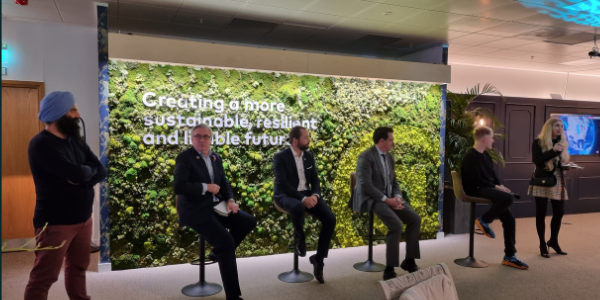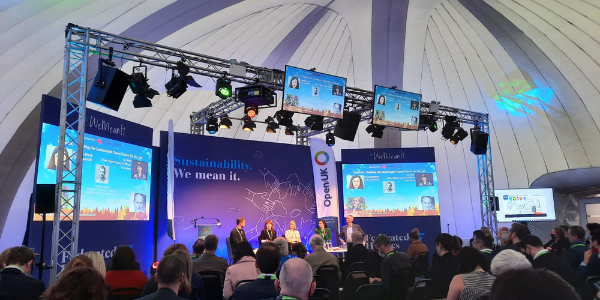Good COP? Bad COP?
With COP26 in Glasgow - our home - we had to get out and speak to as many people as possible to gain their views on the event, it’s anticipated success (or failure) and personal ambitions. So I embarked on a busy few days discussing TEDxGlasgow’s year of Make or Break with many leaders, CEOs and citizens.
We’ve got lots to share with you over the coming months to keep informing and inspiring. The intent of COP shouldn’t stop as soon as the event does. We’re here for the long haul and it’s important that everyone else is too (we’re looking at you Mr J!). Here’s my initial round up of some great events, conversations and experience.
Wood House at COP26 ran an excellent program led by Ann Rosenberg, full of panel discussions, dinners and networking opportunities that demonstrated how vast a community of climate actors actually can be; ranging from city Mayors, Entrepreneurs, and organisations such as P4G, UNDP, Project Everyone, The B Team and the list goes on!
Gurjit (left) at the Wood House panel discussion
Leaders and CEO’s such as Sharan Burrow, Saddique Khan, Bob Moritz, Jesper Bordin, Halla Tomazdottir and David Boynton, whom we interviewed told us about their ongoing work on sustainability, and made it clear that there is a lot more to do. Consistent feedback was that we’ve big elephants in the room, (yes there are a herd of them) which included:
The need to give politics permission to plan long term and hold them accountable;
Reducing subsidies across fossil, flights, and other high carbon emitting sectors is essential to halt the carbon we keep putting into the atmosphere;
Building an education system that teaches you how to be a climate social entrepreneur can push solutions, create jobs and support a just transition for all;
Investment in Artificial Intelligence and Machine Learning is happen but needs more focus on climate justice;
Money needed to accelerate climate solutions could be achieved by removing tax havens, ensuring everyone pays their taxes (especially those that have over $1 bn in savings, stocks or elsewhere!);
Carbon footprint management needs to focus on non-behaviour change actions as these will be adopted faster (ie reviewing your pensions, savings, where they are invested, using green energy providers, lobbying government for good, and voting!).
Innovative solutions showcased and debated at many events were interesting, including BMW’s Group Dialogue Breakfast which included Prof. Dr. Michael Braungart, the pioneer of the Cradle to Cradle concept. Dr. Thomas Becker and Anna Goldhofer explored service design ideas for a future where cars are shared and smartly recycled, and the adoption of renewable materials such as mushroom based leathers, as part of the car manufacture process were put into strong debate with the audience.
The Further, Faster conference by Federated Hermes had Tim Lenton, Baroness Helena Kennedy, John Elkington, Professor Gail Whiteman and Lovro Valcic from the Arctic Basecamp tell their perspectives on the journey of climate change and the role the finance sector can embrace to act and realise climate solutions faster. A collaboration with Rainn Wilson by Arctic Basecamp was fantastic to learn about.
Spending time around powerful and inspirational people at places such as Goals House, who are truthfully committed to addressing climate change has been an eye-opening journey, but also a stark reminder that COP is not a realistic representation of society, our businesses, or global leaders and has historically been a governmental affair.
My experience has confirmed that we need more diversity in those making decisions at the negotiation table, and that we are beginning not the end of climate action. We’ll keep working on Make or Break and action in support of the SDGs at TEDxGlasgow and to help build the post-COP26 legacy we want to see from the Glasgow Pact.
Gurjit Singh Lalli - TEDxGlasgow Founder



